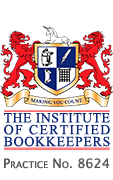HMRC GETTING TOUGHER
With HM Revenue and Customs (HMRC) having introduced new compliance checks for tax, penalties and appeals, across its main taxes from 1 April 2009, there is even more reason for businesses to employ the services of an ICB qualified bookkeeper.
Businesses are being urged to prepare for a tougher compliance checking regime, imposed by HMRC under new legislative powers. The Finance Act 2008 grants HMRC the right to visit businesses in order to inspect premises, assets and records, and to ask taxpayers and third parties for further documentation.
As part of the changes, new time limits for assessment and claims will apply from the end of the accounting period or tax year. A four-year time limit will also apply to taxpayer claims.
The legislation is intended to provide a modern framework of aligned powers for HMRC, while making the tax system 'simpler and more consistent', a spokesperson said. To help taxpayers understand the new rules, HMRC has published an e-learning package. The guidance can be found on the
HMRC website.
HMRC has reported that if reasonable care is taken to get tax right, they will not penalise businesses, even if a mistake is made.
However reasonable care includes but not limited to:
- Keeping accurate records to make sure tax returns are correct
- Checking with HMRC if you need clarification
- Reporting errors to HMRC promptly if they are discovered after sending
If reasonable care is not taken, errors will be penalised and the penalties will be higher if the error is deliberate. Disclosing errors to HMRC will substantially reduce any penalty due.
Here is a break down of the records which must be kept:
Basic record keeping
- A record of all sales, with copies of any invoices issued
- A record of all business purchases and expenses
- Invoices for all business purchases and expenses
- Details of any amounts personally paid into or taken out from the business
- Copies of business bank statements
Examples of records which should be kept:
- Cash book
- Petty cash book
- Order notes and invoices
- Copy sales invoices
- Details of any other business income received
- Details of any private money brought into the business
- Till rolls or other form of electronic record of sales
- Details of any other income
- Any cash taken out of the till to pay small business expenses
- Bills and invoices for purchases and expenses
- A record of stock on hand at the end of the year
- All bank and building society statements
- All pass books, cheque stubs and paying-in slips
Business and personal records must be kept separately. Assets used for both business and personal purposes must be recorded, for example shop premises that include a flat, with detail kept of what expenditure relates to business use and what is private.
Sales Records must be kept of any stock taken for personal and family consumption goods or services supplied to someone else in exchange for goods or services, including barter transactions.
Motor vehicle records must be maintained if the same vehicle is used for business and private purposes. Detail should be kept recording the total amount spent between business and private use. Keeping a record of business and private mileage and splitting the vehicle running costs in the same proportions will suffice.
Capital allowance records must be kept of purchases and sales of assets that you use in the business, such as equipment etc.
07/04/2009
Article Source - Institute of Certified Bookkeepers
